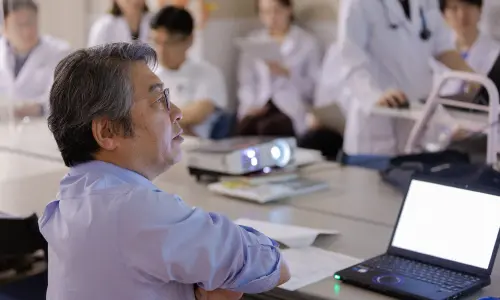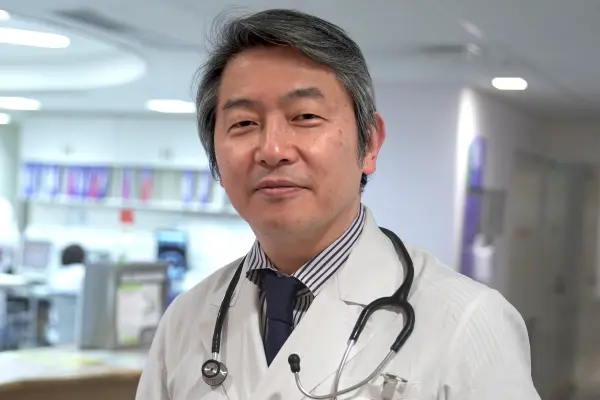MISSION
Achieve the world's highest medical safety with the latest technology.
For example, it has been reported that the inappropriate insertion of chest drain occurs more commonly than doctors' expectations. Inappropriate insertion involves very serious risks, such as inadvertent puncture of a lung or heart if the needle deviates from the target area.
In the 30 years since Dr. Suzuki became a thoracic surgeon, this situation has remained unchanged. This is because ultrasound, which is used in the medical industry to guide drain insertion, could rarely be used in the chest area.
This is why we have explored the possibility of leveraging the latest technology to overcome the present situation that poses a high risk to patients worldwide.
This hope and idea Dr. Suzuki held for 30 years was the starting point of this project.
PRODUCT
Achieve the world's highest medical safety with the latest technology.
Thoracic drainage is a routine medical practice in the field and a procedure to remove accumulated air or fluid from the thoracic cavity. Although this basic procedure is frequently performed, deaths associated with thoracic drainage occur intermittently, and the Accident Investigation Committee of the Ministry of Health, Labour and Welfare has issued multiple warnings. However, serious complications still occur both in Japan and worldwide.
Although puncture is supported by ultrasound guidance in practice, it cannot be used in the chest area because the thoracic cavity is the only body cavity containing gas.
As a measure to overcome this limitation, overlays of chest CT images onto the patient's body using augmented reality (AR) technology can considerably support clinicians, while significantly reducing risks.

Applications of Thoracentes AR technology
Since doctors cannot observe the tip of the puncture device throughout the procedure, the procedure always involves a risk of organ injury, and accidents leading to death are not uncommon.

Select the site and the direction of puncture from X-ray or CT images


Confirm the site of puncture from the body surface, based on positions of organs in the images


The actual puncture site sometimes differs from the preselected site

During body cavity puncture, information of organ positions can be superimposed onto the patient’s body to visualize the body cavity details, thereby facilitating determination of the appropriate drain insertion position and angle.

Overlay pre-acquired CT image information onto the patient’s body using AR technology


The puncture position can be confirmed as if the doctor can see inside the patient's body


Overlay of CT images onto the patient’s body enables the doctor to visualize organ positions during puncture
TEAM

Kenji Suzuki, M.D., & Ph.D.
Professor, General Thoracic Surgery, Juntendo University
CEO
Graduated from National Defense Medical College in 1990. Passed the National Medical Practitioners Qualifying Examination. Resident, National Defense Medical College in 1991. Completed the US Navy Undersea Medical Officer Course in 1993. Resident, National Cancer Center Hospital East in 1995. Senior resident specialized in oncology, National Cancer Center Hospital East in 1997. Attending Surgeon, Department of Thoracic Surgery, National Cancer Center Hospital in 1999. Head, Department of Thoracic Surgery, National Cancer Center Hospital in 2007. Professor, General Thoracic Surgery, Juntendo University School of Medicine in 2008. Received several awards, including the Japanese Association for Chest Surgery Award, the Japanese Cancer Association's Young Investigator Award, and the Japan Lung Cancer Society's Shinoi-Kawai Award.
COMPANY
| Corporate Name | Thoracentes, Inc. |
|---|---|
| Founded | February 28, 2023 |
| Capital | 100,000,000 yen |
| CEO | Kenji Suzuki, M.D., & Ph.D. Professor, General Thoracic Surgery, Juntendo University |
| Member of the Board | Yoshio Shimo |
| Member of the Board | Koichi Suzuki |
| Member of the Board | Ryota Oike |
| Business activities | Development of medical devices using augmented reality (AR) and relevant technologies |
| Address | THE HILLS HONGO 6F, 2-17-12 Hongo, Bunkyo-ku, Tokyo 113-0033 |
| Tel | 03-4400-6614 |
RECRUIT

We are recruiting members to work in collaboration.
We are seeking colleagues who will share the mission and vision of Thoracentes. Please contact us for more information.
Positions open:
Project Manager/Development Engineer/
UX/UI Designer/Regulatory Affairs Manager/
Quality Control Manager/Business Development Manager
